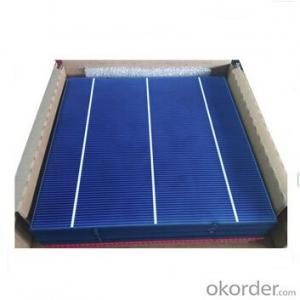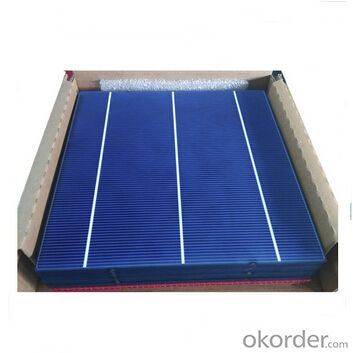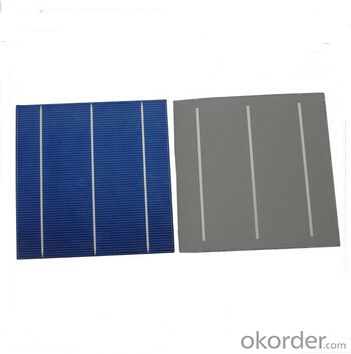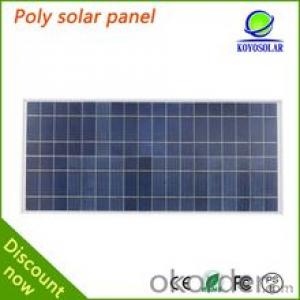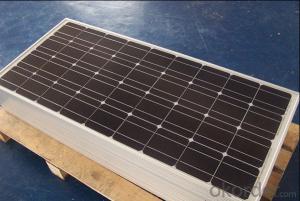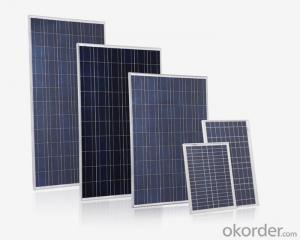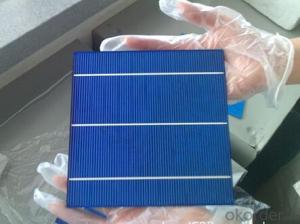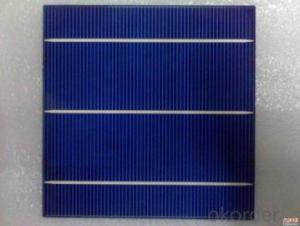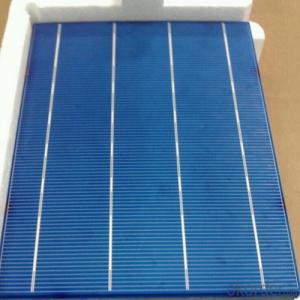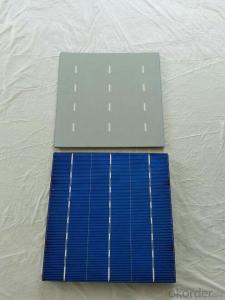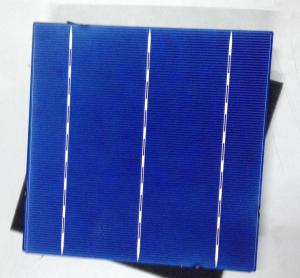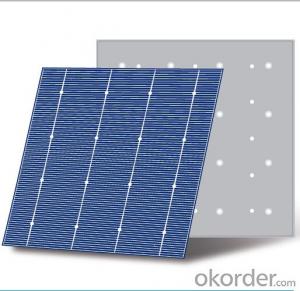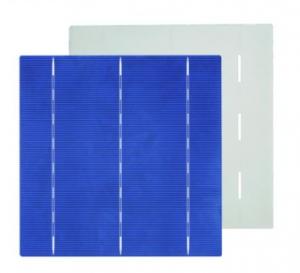2nd Generation Polycrystalline Silicon Solar Cell with 3 Bus Bars Alkaline
- Loading Port:
- Shanghai
- Payment Terms:
- TT OR LC
- Min Order Qty:
- 1000 pc
- Supply Capability:
- 1000000 pc/month
OKorder Service Pledge
OKorder Financial Service
You Might Also Like
PolyCrystalline Silicon Solar Cell 3 Bus Bars Alkaline:
Solar cells is made by solar wafer, it has three categories of solar cell right now, monocrystalline polycrystalline and thin film,These cells are entirely based around the concept PN junction, which is the critical part of solar module, it is the part that can convert the light energy into electricity, the thickness is from 180um to 200um, with even busbars to conduct electricity, textured cell can decrease diffuse reflection; they are often electrically connected and encapsulated as a module. Photovoltaic modules often have a sheet of glass on the front (sun up) side, allowing light to pass while protecting semiconductor wafers from abrasion and impact due to wind-driven debris, rain, hail, etc. Solar cells are also usually connected in series in modules, creating an additive voltage. Connecting cells in parallel will yield a higher current;With high quality and stable quality. Our Cells can greatly improve the performance of Solar Modules.
PolyCrystalline Silicon Solar Cell 3 Bus Bars Alkaline Advantage:
• High efficiency and stable performance in photovoltaic conversion.
• Advanced diffusion technique ensuring the homogeneity of energy conversion efficiency of the cell.
• Advanced PECVD film forming, providing a dark blue silicon nitride anti-reflection film of homogenous color and attractive appearance.
• High quality metal paste for back surface and electrode, ensuring good conductivity, high pulling strength and ease of soldering.
• High precision patterning using screen printing, ensuring accurate busbar location for ease with automatic soldering a laser cutting.
Specifications:
Efficiency code | 1640 | 1660 | 1680 | 1700 | 1720 |
Efficiency(min) (%) | 16.4 | 16.6 | 16.8 | 17.0 | 17.2 |
Pmax (W) | 3.991 | 4.040 | 4.088 | 4.137 | 4.186 |
Voc (V) | 0.621 | 0.622 | 0.623 | 0.625 | 0.627 |
Isc (A) | 8.203 | 8.267 | 8.335 | 8.398 | 8.454 |
Vmp (V) | 0.519 | 0.520 | 0.521 | 0.523 | 0.525 |
Imp (A) | 7.690 | 7.769 | 7.847 | 7.910 | 7.973 |
Packaging & Delivery of Polycrystalline Solar Cells
Carton Box Package and Deliver by air. It should be noticed that it should be avoid of water, sunshine and moist.
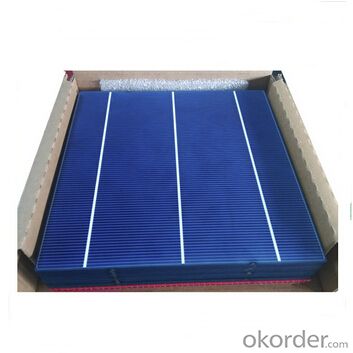
FAQ
We have organized several common questions for our clients,may help you sincerely:
①What price for each watt?
It depends on the efficiency of the solar cell, quantity, delivery date and payment terms.
②How long can we receive the product after purchase?
In the purchase of product within three working days, We will arrange the factory delivery as soon as possible. The pecific time of receiving is related to the state and position of customers.Commonly 7 to 10 working days can be served.
③Can you provide the peripheral products of the solar panels, such as the battery, controller, and inverter? If so, can you tell me how do they match each other?
Yes, we can, we have two companies for solar region, one is CNBM International, the other is CNBM engineering Co.
We can provide you not only the solar module but also the off grid solar system, we can also provide you service with on grid plant.
④What is your warranty of solar cell?
Our product can promise lower than 0.3% open box crack, we support claim after opening the box if it has crackm color difference or sth, the buyer should give pictures immediately, we can not accept the claim after the solar cell has assembled to solar panel.
• Timeliness of delivery
• ⑤How do you pack your products?
We have rich experience on how to pack the solar cell to make sure the safety on shipment, we could use wooden box or pallet as buyer's preference.
⑥ Can you do OEM for us?
Yes, we can.
- Q: Can solar cells be used in disaster relief or emergency response situations?
- Yes, solar cells can be used in disaster relief or emergency response situations. They provide a reliable and sustainable source of power, especially in areas where the traditional electricity grid may be damaged or inaccessible. Solar cells can be used to generate electricity to power essential equipment, communication systems, and medical devices, ensuring effective response and aid delivery in emergency situations. Additionally, their portability and quick installation make them ideal for rapid deployment and temporary power supply in disaster-stricken areas.
- Q: Can solar cells be used to power satellites?
- Yes, solar cells can be used to power satellites. In fact, they are the primary source of power for most satellites in space. Solar cells convert sunlight into electricity, which is then used to power the various systems and instruments on board the satellite.
- Q: How do solar cells perform in high altitude regions?
- Solar cells perform more efficiently in high altitude regions due to several factors. Firstly, high altitudes often have less air pollution, which means there are fewer particles in the air that can block or scatter sunlight. This allows solar cells to receive more direct sunlight, resulting in increased energy production. Additionally, solar cells operate more efficiently at lower temperatures, and high altitudes generally have cooler temperatures compared to lower elevations. Cooler temperatures help to reduce heat-related losses and improve the overall performance of solar cells. Therefore, solar cells in high altitude regions tend to generate more electricity and have higher conversion rates.
- Q: What is the impact of solar cells on reducing greenhouse gas emissions?
- Solar cells have a significant impact on reducing greenhouse gas emissions as they generate clean and renewable energy from the sun without producing any harmful emissions. By replacing traditional fossil fuel-based electricity generation, solar cells help to mitigate climate change by reducing the release of greenhouse gases, such as carbon dioxide, into the atmosphere. This transition to solar energy not only contributes to a cleaner environment but also helps in achieving global climate goals and creating a sustainable future.
- Q: Can solar cells be used to power remote locations?
- Yes, solar cells can be used to power remote locations. Solar cells convert sunlight into electricity, making them an ideal renewable energy source for areas that are not connected to the traditional power grid. They can be installed in remote locations to generate electricity and provide a reliable power supply. Additionally, solar cells are low-maintenance and have a long lifespan, making them a cost-effective solution for powering remote areas.
- Q: What is the role of solar cells in powering emergency response systems?
- Solar cells play a crucial role in powering emergency response systems by providing a reliable and sustainable source of energy. During emergencies, when the traditional power grid may be disrupted or unavailable, solar cells can generate electricity from sunlight, ensuring continuous operation of critical systems such as communication devices, lighting, and medical equipment. This renewable energy source helps emergency responders effectively carry out their duties, enabling them to provide aid, maintain connectivity, and save lives in challenging situations.
- Q: Can solar cells be used for off-grid living?
- Yes, solar cells can definitely be used for off-grid living. They provide a clean and reliable source of renewable energy, allowing individuals to generate their own electricity without relying on the traditional power grid. Solar cells can be used to power various appliances, lighting systems, and even charge batteries for nighttime usage. This makes solar energy an ideal solution for those living in remote areas or seeking a sustainable and independent lifestyle.
- Q: Can solar cells be used in powering remote monitoring systems?
- Yes, solar cells can be used to power remote monitoring systems. Solar cells are capable of converting sunlight into electricity, which can then be used to power various devices, including remote monitoring systems. This makes them an ideal choice for remote locations where access to traditional power sources may be limited or non-existent. Solar-powered remote monitoring systems are not only environmentally friendly but also offer a reliable and sustainable solution for monitoring and collecting data in remote areas.
- Q: Can solar cells be used for powering desalination plants?
- Yes, solar cells can be used for powering desalination plants. Solar energy can be harnessed through photovoltaic panels, which convert sunlight into electricity. This electricity can then be used to power the desalination process, where saltwater is converted into freshwater through various methods such as reverse osmosis or distillation. Utilizing solar cells for powering desalination plants offers a sustainable and renewable energy source, reducing reliance on fossil fuels and minimizing the environmental impact of the desalination process.
- Q: How do solar cells perform in different geographic locations?
- Solar cells perform differently in different geographic locations due to variations in sunlight intensity and duration. Generally, solar cells perform better in regions closer to the equator with higher solar irradiance. However, solar cells can still generate electricity in less sunny locations, although their efficiency may be lower. Factors such as climate, cloud cover, pollution, and shading also impact solar cell performance. Additionally, the angle at which solar panels are installed can optimize energy production in specific geographic locations.
Send your message to us
2nd Generation Polycrystalline Silicon Solar Cell with 3 Bus Bars Alkaline
- Loading Port:
- Shanghai
- Payment Terms:
- TT OR LC
- Min Order Qty:
- 1000 pc
- Supply Capability:
- 1000000 pc/month
OKorder Service Pledge
OKorder Financial Service
Similar products
Hot products
Hot Searches
Related keywords
